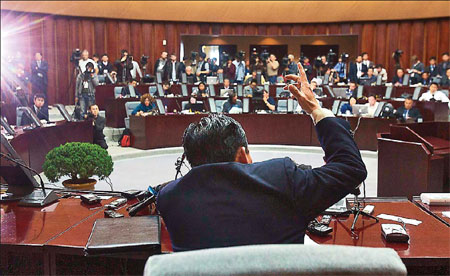China again calls for launch restraint
Updated: 2012-04-11 07:17
By Zhao Shengnan (China Daily)
|
||||||||

|
Ryu Gum-chol, (above and top), an official with the DPRK's Committee for Space Technology, addresses foreign journalists in Pyongyang on Tuesday. [Photos by David Guttenfelder / AP] |
DPRK rejects accusations that satellite mission is act of aggression
China renewed its call for restraint on Tuesday as Pyongyang said, in a rare news briefing for foreign journalists, that its planned rocket launch is not an act of aggression.
Experts said that Pyongyang's unprecedented media openness reflects its intent to play down tension and engage more with the international community.
"China urges parties involved to remain calm and show restraint, abide by international law and prevent further tension on the Korean Peninsula," Foreign Ministry spokesman Liu Weimin told a news conference in Beijing.
China maintains its position on the denuclearization of the peninsula, he said.
China has expressed concern over the planned launch on a number of occasions.
The Democratic People's Republic of Korea last month announced plans to launch the Kwangmyongsong-3, an Earth observation satellite, between Thursday and Monday, to mark the 100th anniversary of the birth of DPRK founder Kim Il-sung.
The US and its allies insist that the launch would be a disguised long-range ballistic missile test that breached a UN Security Council resolution that prohibited the DPRK from conducting launches that use ballistic missile technology.
In the country's rare news conference for foreign journalists, a DPRK official said in Pyongyang on Tuesday the rocket doesn't have the same "attack capability" as a ballistic missile.
"It is a carrier rocket but not a ballistic missile," said Ryu Gum-chol from the DPRK's Committee for Space Technology, adding that the launch is a peaceful program to develop the economy and raise living standards.
"The rocket is equipped with a self-destruct system" and will not affect other countries, Ryu, deputy director of the committee's space development department, said.
The launch date has not been set as preparations are still under way, he said.
The 100-kg satellite will be installed atop the Unha-3 carrier rocket, and the first two stages of the rocket will be jettisoned in designated areas, he said.
But the US and its allies said they were still concerned.
US State Department spokeswoman Victoria Nuland said on Monday that the launch was provocative.
"We are also working with our six-party counterparts to try to make the same points to the DPRK and to urge all of the countries in the Six-Party Talks to use their influence with the DPRK," she said.
The Republic of Korea said on Monday that the country and the US were tightening surveillance as the launch approached, according to a Joint Chief of Staff official.
The ROK military is "fully prepared" and "strengthening surveillance" to respond to any acts of provocation, the official said on condition of anonymity.
According to Beijing Capital International Airport, Air Koryo increased the number of Beijing-Pyongyang flights on Tuesday to accommodate foreign reporters flocking to the DPRK.
The rare media exposure signaled that Pyongyang is more flexible and trying to take the initiative in its fight against Western sanctions, Gong Yuzhen, a military expert and professor at Peking University, said.
Wang Junsheng, an expert of Northeast Asian studies at the Chinese Academy of Social Sciences, said that Pyongyang's openness to the outside world has increased since Kim Jong-un became the new leader.
"Through opening to the foreign media, Pyongyang also wants to reduce the risk of escalating tension brought by the launch," he said.
Xinhua and Zhang Yunbi contributed to this story.
zhaoshengnan@chinadaily.com.cn

 Relief reaches isolated village
Relief reaches isolated village
 Rainfall poses new threats to quake-hit region
Rainfall poses new threats to quake-hit region
 Funerals begin for Boston bombing victims
Funerals begin for Boston bombing victims
 Quake takeaway from China's Air Force
Quake takeaway from China's Air Force
 Obama celebrates young inventors at science fair
Obama celebrates young inventors at science fair
 Earth Day marked around the world
Earth Day marked around the world
 Volunteer team helping students find sense of normalcy
Volunteer team helping students find sense of normalcy
 Ethnic groups quick to join rescue efforts
Ethnic groups quick to join rescue efforts
Most Viewed
Editor's Picks

|

|

|

|

|

|
Today's Top News
Health new priority for quake zone
Xi meets US top military officer
Japan's boats driven out of Diaoyu
China mulls online shopping legislation
Bird flu death toll rises to 22
Putin appoints new ambassador to China
Japanese ships blocked from Diaoyu Islands
Inspired by Guan, more Chinese pick up golf
US Weekly

|

|







